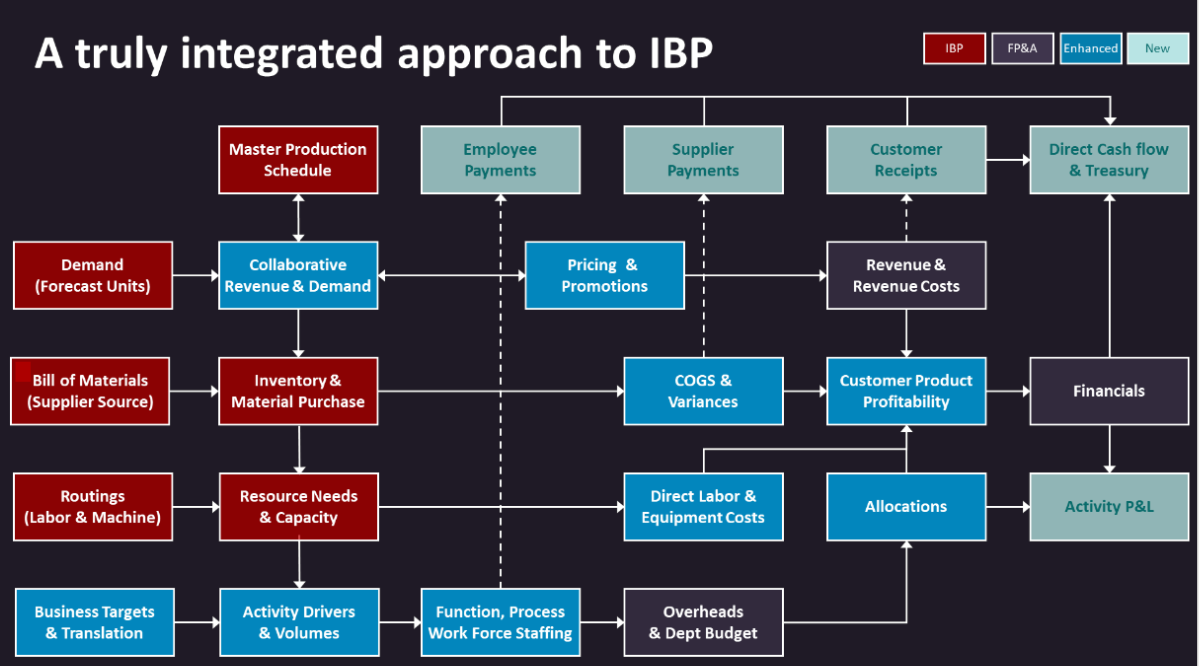In an increasingly volatile global market landscape, organizations are constantly faced with the challenge of aligning their strategic goals with operational capabilities. This alignment is crucial not only for survival but for thriving amidst uncertainties. Integrated Business Planning (IBP) emerges as a beacon of strategic excellence, guiding companies through the choppy waters of global supply chains, fluctuating demand, and the relentless pace of technological advancement. As a consulting and advisory firm with supply chain expertise and comprehensive background in Sales and Operations Planning (S&OP), scenario analysis, and financial planning, we've observed firsthand the transformative impact of IBP on organizational performance.
Understanding Integrated Business Planning
Integrated Business Planning is an evolved form of S&OP that encompasses a wider range of business processes, including finance, HR, IT, and marketing, alongside traditional supply chain operations. IBP extends beyond mere operational alignment, fostering a holistic view of the organization’s strategic goals and operational capabilities. It is a management framework that ensures strategic planning, operation and finance are seamlessly integrated, facilitating better decision-making and more robust performance management.

The Impact of IBP on Organizational Performance
Enhanced Decision-Making
IBP enables organizations to make informed decisions by providing a comprehensive view of the business landscape. This is achieved through advanced scenario planning and simulation techniques that consider various factors such as market trends, demand fluctuations, supply chain disruptions, production bottlenecks and inventory challenges. By analyzing these scenarios, businesses can anticipate challenges and opportunities, thereby enhancing strategic agility and financial performance.
Improved Financial Performance
A direct correlation exists between successful IBP implementation and improved financial performance. Organizations that excel in IBP report higher revenue growth, improved profit margins, reduced costs and better cash flow. This improvement is largely due to the ability of IBP to synchronize supply and demand, optimize inventory levels, and streamline operational processes, thereby reducing waste and inefficiencies.
Strategic Alignment and Execution
IBP serves as a bridge between strategic planning and execution. By integrating business plans across functions, IBP ensures that organizational goals are translated into actionable operational plans. This alignment is critical for executing corporate strategy effectively, as it ensures that all departments are working towards a common objective.
Increased Responsiveness to Market Changes
In today's fast-paced market environment, responsiveness is key to maintaining competitive advantage. IBP enhances an organization's ability to respond quickly to market changes by providing a framework for continuous planning and replanning. This agility is crucial for adapting to unexpected market shifts, consumer behavior changes, and supply chain disruptions.
Improved Collaboration and Communication
IBP fosters a culture of collaboration and open communication by bringing together various functional teams to work towards a common goal. This collaborative approach breaks down silos, promotes knowledge sharing, and encourages cross-functional problem-solving, leading to more innovative solutions and a more cohesive organizational culture.
Implementing IBP for Organizational Success
The journey towards an effective IBP requires commitment, discipline, and a change in organizational culture. It involves:
- Executive Sponsorship: Strong leadership and support from top management are crucial for driving the IBP initiative forward.
- Cross-functional Teams: Establishing dedicated teams comprising members from different functions ensures diverse perspectives and expertise in the planning process.
- Technology and Tools: Leveraging advanced analytics, AI, and machine learning technologies can enhance the accuracy of forecasts and the efficiency of the planning process.
- Continuous Improvement: IBP is not a one-time initiative but a continuous process that requires regular review, adjustment, and optimization.
Integrated Business Planning is not merely a tactical approach to aligning supply chain operations with business strategy; it is a strategic imperative for organizations aiming for resilience, agility, and sustained performance in the face of global challenges. By embracing IBP, organizations can ensure that they are well-positioned to navigate the complexities of the modern business environment, achieving not only operational excellence but also strategic success.
To learn more about implementing IBP in your organization, attend QueBIT’s upcoming webinar on the subject or reach out for a personalized briefing. https://quebit.com/resources/events-and-webinars/